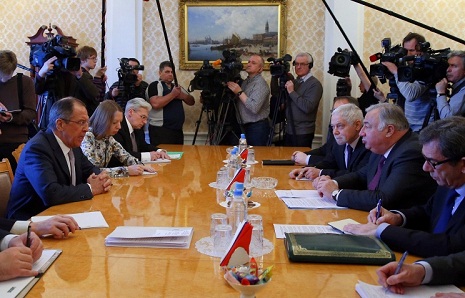The Russian foreign minister said the current situation in Syria and Iraq needs joint steps on "neutralizing threats of terrorism and extremism."
Lavrov said Moscow appreciates Larcher’s interest towards overcoming the current uneasy period in relations between Russia and Europe. He also said he expected to exchange views on topical issues at talks.
Many politicians and business representatives of France do not want the relations with Russia to "become hostage of a foreign policy and political environment," Lavrov said.
This is Larcher’s first visit outside the EU since he assumed office in October 2014.
"You have a rich program in Moscow and I am convinced that you will be able to have a more correct impression on what is happening in the relations between Russia and the West and how we see the ways to remedy the situation," Lavrov said.
In his turn, Larcher said: "It is important that the channels of inter-parliamentary cooperation should remain open." He noted that the parliaments of the Normandy Four countries (Russia, France, Germany and Ukraine) could cooperate in particular on defining a concept for decentralization in Ukraine.
The speaker of France’s Senate also thanked Lavrov for participating in the January 11 march in Paris in solidarity following the Charlie Hebdo attacks.
Western sanctions against Russia
Russian officials and companies came under the first batch of Western sanctions, including visa bans and asset freezes, after Russia incorporated Crimea in mid-March 2014 after the February 2014 coup.
Despite Moscow’s repeated statements that the Crimean referendum on secession from Ukraine was in line with the international law and the UN Charter and in conformity with the precedent set by Kosovo’s secession from Serbia in 2008, the West and Kiev have refused to recognize the legality of Crimea’s reunification with Russia.
More about:















































